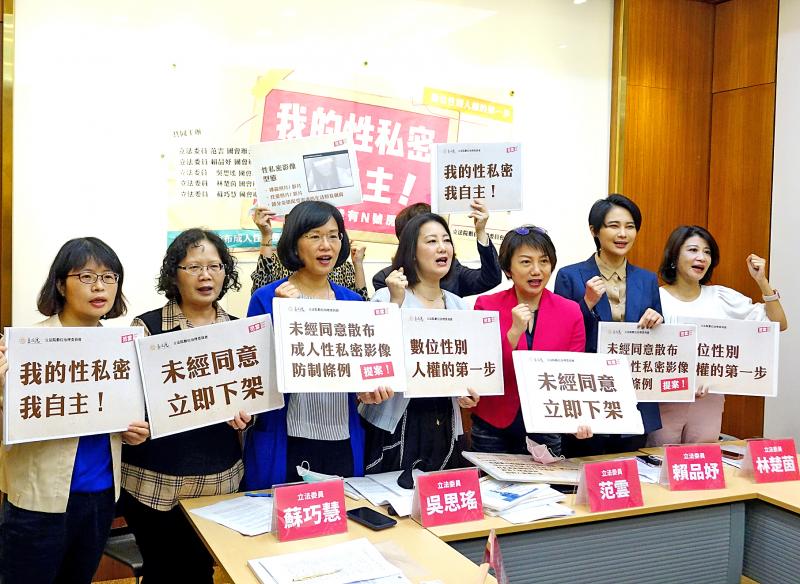Democratic Progressive Party (DPP) Legislator Fan Yun (范雲) and other lawmakers yesterday said that they would propose legislation to protect victims of nonconsensual dissemination of intimate images.
The legislation aimed at preventing “digital gender violence” is being introduced due to an absence of laws that offer adequate protection to victims, Fan told a news conference in Taipei.
The bill would include a mechanism for the immediate removal of private sexual images, Fan said, adding that everyone, regardless of their gender, should have autonomy over such images.

Photo: Wang Yi-sung, Taipei Times
It would also provide victims with protective services, she said.
DPP legislators Lai Pin-yu (賴品妤), Su Chiao-hui (蘇巧慧), Lin Chu-yin (林楚茵) and Rosalia Wu (吳思瑤) joined Fan and other advocates in chanting: “My sexual privacy, my choice” and “Taiwan cannot have the Nth Room” — a reference to a South Korean scandal involving blackmail, cybersex trafficking and the spread of sexually exploitative content.
When the Domestic Violence Prevention Act (家庭暴力防治法) was enacted about 20 years ago, many felt that domestic violence was a private matter of couples, Wu said, adding that without the act, people’s views would have remained unchanged.
A similar attitude prevails today toward proposals designed to guarantee “digital human rights,” she said.
No single government agency is responsible for handling matters related to the dissemination of private sexual images, Wu said, adding that the bill would make the Ministry of the Interior the competent authority.
The health, education, justice and cultural ministries, as well as the National Communications Commission, would also be tasked with responding to incidents under their purview, she said.
Su called the spread of intimate images on online platforms a new type of crime and a new class of cybercrime, for which there must be laws.
Lai said that when private images are leaked, it is often the victim who is blamed or mocked, while the perpetrator is let off lightly.
Such cases are typically handled through articles in the Criminal Code against the distribution of obscene material and slander, but the penalties for those two offenses are not very harsh, she said.
Under the Criminal Code, the distribution of obscene material is punishable by up to two years in prison and/or a fine of up to NT$90,000, while the maximum penalty for slander is a two-year sentence or a fine of up to NT$30,000.
Crimes involving the dissemination of private images have existed in Taiwan for years and would only become worse with the development of the Internet, Lai said.
“Now is the time for legislation,” she said.
Members of the Taipei Women’s Rescue Foundation and the Taiwan Alliance for Advancement of Youth Rights and Welfare were also at the news conference in support of the lawmakers’ proposal.
Foundation deputy chief executive Tu Ying-chiu (杜瑛秋) said that since 2015, when the foundation began offering consultation services on cases involving the nonconsensual spread of intimate images, it has assisted in 487 cases, about one-third of which involved people who met through the Internet or social networking apps.

The Grand Hotel Taipei on Saturday confirmed that its information system had been illegally accessed and expressed its deepest apologies for the concern it has caused its customers, adding that the issue is being investigated by the Ministry of Justice Investigation Bureau. The hotel said that on Tuesday last week, it had discovered an external illegal intrusion into its information system. An initial digital forensic investigation confirmed that parts of the system had been accessed, it said, adding that the possibility that some customer data were stolen and leaked could not be ruled out. The actual scope and content of the affected data

DO THEY BITE IT? Cats have better memories than people might think, but their motivation is based entirely around the chance of getting fed Cats can remember the identity of the people who fed them the day before, Taipei-based veterinarians said on Friday, debunking a popular myth that cats have a short memory. If a stray does not recognize the person who fed them the previous day, it is likely because they are not carrying food and the cat has no reason to recognize them, said Wu Chou Animal Hospital head Chen Chen-huan (陳震寰). “When cats come to a human bearing food, it is coming for the food, not the person,” he said. “The food is the key.” Since the cat’s attention is on the food, it

‘LIKE-MINDED PARTNER’: Tako van Popta said it would be inappropriate to delay signing the deal with Taiwan because of China, adding he would promote the issue Canadian senators have stressed Taiwan’s importance for international trade and expressed enthusiasm for ensuring the Taiwan-Canada trade cooperation framework agreement is implemented this year. Representative to Canada Harry Tseng (曾厚仁) in an interview with the Central News Agency (CNA) said he was increasingly uneasy about Ottawa’s delays in signing the agreement, especially as Ottawa has warmed toward Beijing. There are “no negotiations left. Not only [is it] initialed, we have three versions of the text ready: English, French and Mandarin,” Tseng said. “That tells you how close we are to the final signature.” Tseng said that he hoped Canadian Prime Minister Mark Carney

President William Lai (賴清德) yesterday bestowed one of Taiwan’s highest honors on Saint Vincent and the Grenadines (SVG) Ambassador Andrea Clare Bowman in recognition of her contributions to bilateral ties. “By conferring the Order of Brilliant Star with Grand Cordon on Ambassador Bowman today, I want to sincerely thank her, on behalf of the Taiwanese people, for her outstanding contribution to deepening diplomatic ties between Taiwan and SVG,” Lai said at a ceremony held at the Presidential Office in Taipei. He noted that Bowman became SVG’s first ambassador to Taiwan in 2019 and